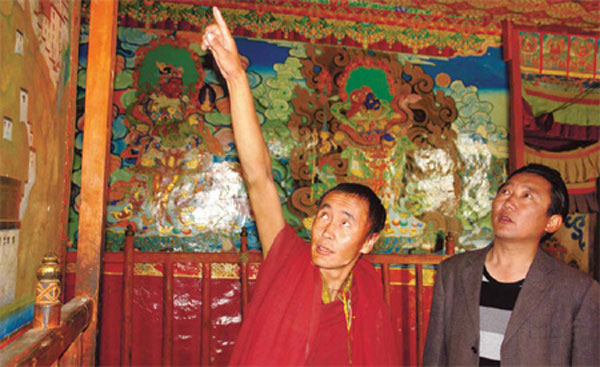Learning to close the gap
Updated: 2011-05-06 11:06
By Hu Yongqi (China Daily European Weekly)
 |
|
Many graduates from Tibet middle schools across China work in important fields back home in Tibet. These three graduated from Beijing Tibet Middle School. Clockwise from above: Tashi Tsering (right), a 1991 middle school graduate from Beijing Tibet Middle School, is deputy director of the religious affairs bureau of Dingri county of Xigaze prefecture. He checks with a lama about paintings in a monastery. Tseping (right), a middle school graduate in 1991, is a judge of Gyangze court in Xigaze. Tsepel, a 1997 high school graduate, is a gynecologist at the No 1 People's Hospital in Lhasa. Photos Provided to China Daily |
 |
Energy, not sheep
Sonam Jorden was born in Cona county of Shannan prefecture, a small county neighboring Nepal. In 1993, when he was in sixth grade, his teacher told him there was a chance he could live and study in South China's Guangdong province if he took a test and scored well.
At the time, parents in Cona were unwilling to send their children to high school locally because it did not pay off. After three years of high school, many teenagers still ended up as farmers. The possibility of studying in Guangdong made Sonam Jorden nervous, he says, but his father encouraged him without hesitation.
"The competition is very ferocious when primary school students apply for Tibet middle schools," Zhang says. "Only one out of 20 applicants will be enrolled."
Sonam Jorden prepared for two months, studying and asking his teachers questions. He became one of 10 students chosen from 200 applicants, and they all headed to the Tibet class affiliated with Huizhou No 8 High School. Sonam Jorden would stay there four years. His first year was dedicated to acclimating to the local environment. He would later attend Hohai University in Nanjing, majoring in thermal energy and dynamics.
He was offered a well-paying engineer's post at an established energy company in Jiangsu province after graduation, but he followed his parents' wishes that he return to Tibet. He is in charge of the repair and maintenance of energy equipment at Yangbajain Geothermal Power Station, which has provided Lhasa more than 2.4 billion kilowatt-hours of electricity over the past 35 years.
He has entered his busiest season because Lhasa, capital of the Tibet autonomous region, consumes more electricity in summer. Last summer, he went to see his parents only once, and he expects that this summer will be no different. Sonam Jorden works in Damxung county, 60 km northwest of Lhasa, and his parents live 375 km southeast of it.
"Though I am very busy, I feel more relaxed and cheerful here," he says. "Ten years of study in Guangdong and Jiangsu were meant to do good to my family and my hometown. If I didn't attend the Tibet class in Huizhou, I may have had to follow my father into raising sheep. The work at this geothermal power plant is what I expected, and I can make use of what I learned to make a difference."
Looking ahead
Sonam Jorden would have been paid more in Jiangsu, but he says he has no regrets. He earns 3,500 yuan (362 euros) a month and saves 2,000 yuan in the bank. He estimated that in two years, he will be able to afford an apartment in Lhasa and live again with his parents.
Dozens of his childhood playmates are farmers in his small hometown and are "a little jealous" when he mentions his experiences with aircraft, Internet cafes and football games. Many of his old neighbors have started to encourage their children to apply for a Tibet middle school, he says.
"Years ago, parents were reluctant to send their children to study in other provinces," says Pasang Namgyal, deputy director of the education bureau of Linzhou county, which is 65 km from Lhasa. "However, the enthusiasm has been growing among parents as they see the success of other children who returned to Tibet becoming more knowledgeable and cultivated."
Now parents are looking for a better education and kids are expected to complete high school, Sonam Jorden says with a smile. The young ones now expect to study at Tibet middle schools, and graduates say they miss their time there.
Dampa Tsering, who graduated from Beijing Tibet Middle School, now works as a township official in Lhasa's Tohlung Dechen county. He says his four years studying in Chongqing and three years in Beijing will stay in his memory for life.
E-paper

Tapping into the future
Foreign companies are investing in China's water industry as many predict a growing profit margin.
Headhunters ride on growth
Commercial property rides wave
Learning from the past
Specials

Cuisine central
London's Chinatown is helping diners appreciate full palate of Chinese food

Tying the knot
Danish couple's high-end macrame export business takes off in the mountains of Yunnan.

Truly a super woman
Li Yuchun first came to prominence in 2005 as the Super Girl winner, and since then has become an international star.
